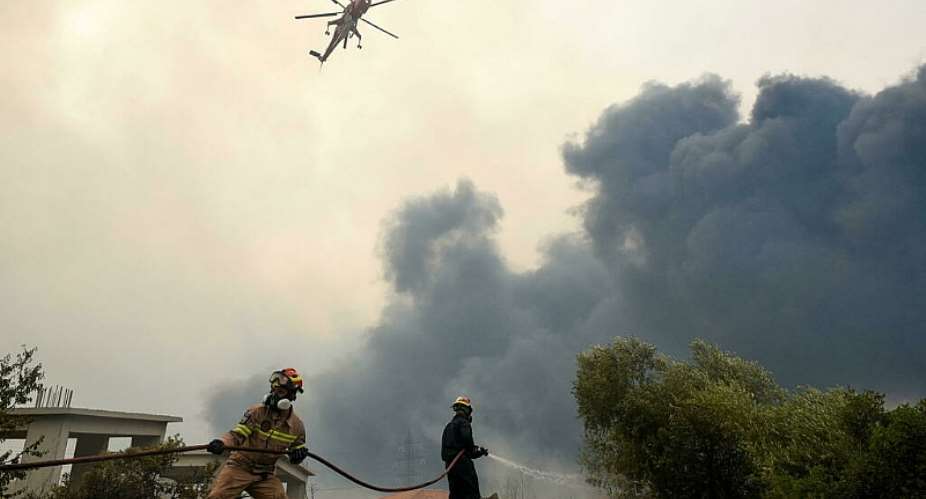Wildfires in North America, around the Mediterranean and in Siberia caused record levels of CO2 emissions this summer, according to Copernicus, the European Union's Earth observation programme.
Heatwaves, drought conditions, and reduced soil moisture amplified by global warming have contributed to unprecedented fires in three continents this summer
Globally, forests going up in flames emitted more than 2.5 billion tonnes of CO2 -- equivalent to India's annual emissions from all sources -- in July and August alone, the Copernicus Atmosphere Monitoring Service (CAMS) reported on Tuesday.
2.5 billion tonnes of CO2
More than half of CO2 emissions from wildfires in July came from North America and Siberia.
"What stood out as unusual were the number of fires, the size of the area in which they were burning, their intensity, and also their persistence," said Mark Parrington, senior scientist and wildfire expert at the CAMS.
Even the Arctic Circle was on fire, releasing some 66 million tonnes of CO2 from June through August, with nearly a billion tonnes from Russia as a whole over the same period.
Fires started raging across northeastern Siberia in June and only started to abate in late August and early September, the satellite-based monitoring service reported.
Burnable area doubled
Emissions for the region from June through August were nearly double compared to the year before.
The World Meteorological Organization (WMO) has reported that the five-year period to 2020 was "unprecedented" for fires, especially in Europe and North America.
- From wildfires to floods, the Mediterranean bears the brunt of catastrophic climate change
- Soaring temperatures trigger massive melting of Greenland ice sheet
While satellite images do not reveal how these fires started, many of the blazes early in the summer are thought to have been caused by "zombie" fires that smoulder through the winter and then reignite.
"Globally, increases in temperature and aridity have increased the length of fire seasons and doubled potential burnable area," the UN's IPCC climate science advisory panel concluded in a draft report.





 Prince Harry, Meghan visit Nigeria
Prince Harry, Meghan visit Nigeria
 Ghana’s electoral commission is one that trusts thieves — Omane Boamah
Ghana’s electoral commission is one that trusts thieves — Omane Boamah
 All government cares about is spending more and more money on itself — Dalex Fin...
All government cares about is spending more and more money on itself — Dalex Fin...
 COVID-19: GHS records 57% vaccination coverage
COVID-19: GHS records 57% vaccination coverage
 My government will support churches – Bawumia assures Clergy
My government will support churches – Bawumia assures Clergy
 Mahama, Bawumia and Alan have flatly failed Ghanaians – Kofi Akpaloo
Mahama, Bawumia and Alan have flatly failed Ghanaians – Kofi Akpaloo
 PAC warns public institutions to comply with the Public Procurement Act
PAC warns public institutions to comply with the Public Procurement Act
 Voter registration: NDC slams EC’s refusal to share serial numbers of BVR kits
Voter registration: NDC slams EC’s refusal to share serial numbers of BVR kits
 Akufo-Addo's 'corrupt, yenkyendi cronyism' cost Ghana $190m stake in US Millenni...
Akufo-Addo's 'corrupt, yenkyendi cronyism' cost Ghana $190m stake in US Millenni...
 Don't be 'conduit' to President Akufo-Addo's 'I can't hand over power to Mahama'...
Don't be 'conduit' to President Akufo-Addo's 'I can't hand over power to Mahama'...
